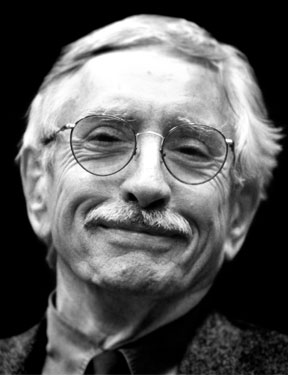Edward Albee (Edward Franklin Albee)

Edward Albee was born in 1928. He was placed for adoption two weeks later and taken to Larchmont in Westchester County, New York, where he grew up. Albee’s adoptive father, Reed A. Albee, the wealthy son of vaudeville magnate Edward Franklin Albee II, owned several theaters. His adoptive mother, Reed’s third wife, Frances (Cotter), was a socialite. Albee attended the Clinton High School, then the Lawrenceville School in New Jersey, from which he was expelled. He then was sent to Valley Forge Military Academy in Wayne, Pennsylvania, where he was dismissed in less than a year. He enrolled at The Choate School (now Choate Rosemary Hall) in Wallingford, Connecticut, graduating in 1946. His formal education continued at Trinity College in Hartford, Connecticut, where he was expelled in 1947 for skipping classes and refusing to attend compulsory chapel. Edward Albee left home for good when he was in his late teens. In a later interview, he said: “I never felt comfortable with the adoptive parents. I don’t think they knew how to be parents. I probably didn’t know how to be a son, either.” More recently, he told interviewer Charlie Rose that he was “thrown out” because his parents wanted him to become a “corporate thug” and did not approve of his aspirations to become a writer.
Edward Albee moved into New York’s Greenwich Village, where he supported himself with odd jobs while learning to write plays. His first play, The Zoo Story, was first staged in Berlin. The less than diligent student later dedicated much of his time to promoting American university theatre. Most recently, he served as distinguished professor at the University of Houston, where he taught an exclusive playwriting course. His plays are published by Dramatists Play Service and Samuel French, Inc. A member of the Dramatists Guild Council, Albee received three Pulitzer Prizes for drama—for A Delicate Balance (1967), Seascape (1975) and Three Tall Women (1994). His play Who’s Afraid of Virginia Woolf was selected for the 1963 Pulitzer Prize by the award’s drama jury, but was overruled by the advisory committee, which elected not to give a drama award at all. The two members of the jury, John Mason Brown and John Gassner, subsequently resigned in protest. Edward Albee was elected a Fellow of the American Academy of Arts and Sciences in 1972. In 1985, Albee was inducted into the American Theatre Hall of Fame. In 1999, Albee received the PEN/Laura Pels International Foundation for Theater Award as a Master American Dramatist. He received a Special Tony Award for Lifetime Achievement (2005); the Gold Medal in Drama from the American Academy and Institute of Arts and Letters (1980); as well as the Kennedy Center Honors and the National Medal of Arts (both in 1996). In 2009, Albee received honorary degree from the Bulgarian National Academy of Theater and Film Arts (NATFA), a member of the Global Alliance of Theater Schools.
In 2008, in celebration of Edward Albee’s eightieth birthday, a number of his plays were mounted in distinguished Off Broadway venues, including the historic Cherry Lane Theatre where the playwright directed two of his early one-acts, The American Dream and The Sandbox. Albee was openly gay and stated that he first knew he was gay at age 12 and a half. He insisted, however, that he did not want to be known as a “gay writer”, stating in his acceptance speech for the 2011 Lambda Literary Foundation’s Pioneer Award for Lifetime Achievement: “A writer who happens to be gay or lesbian must be able to transcend self. I am not a gay writer. I am a writer who happens to be gay.” His longtime partner, Jonathan Thomas, a sculptor, died on May 2, 2005, from bladder cancer. They had been partners from 1971 until Thomas’s death. Albee also had a relationship of several years with playwright Terrence McNally during the 1950s. Albee died at his Montauk, New York, home on September 16, 2016, aged 88.
Born
- March, 12, 1928
- USA
- Virginia
Died
- September, 16, 2016
- USA
- Montauk, New York



